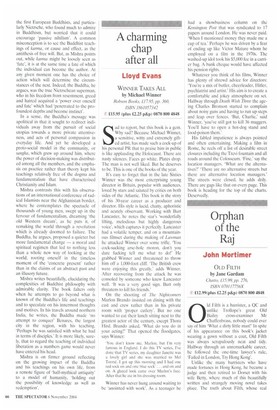The great enemy of dogma
Mick Brown
AN END TO SUFFERING: THE BUDDHA IN THE WORLD by Pankaj Mishra
Picador, 117.99, pp. 422,
ISBN 0330392786 £15.99 (plus £2.25 p&p) 0870 800 4848 Nobody could accuse Pankaj Mishra of lacking ambition. A mixture of memoir, history, political and philosophical treatise. An End to Suffering sets out to tell the historical story of the Buddha and to contextualise his teachings in the development of the Western philosophical tradition. Hindu by birth and rationalist by disposition, Mishra leads us on his own journey from India, to Europe, to America, to the mountains of the Hindu Kush. Descartes, Schopenhauer and Hume jostle for attention, along with pensees on the rise of the nation state, the end of history and Islamic fundamentalism, It sounds an almighty mess. The extraordinary thing is that it works, and triumphantly.
The Buddha of Mishra's account is less the serenely enigmatic figure of religious myth than a philosophical and social revolutionary. The Buddha, he argues, emerged at a time — circa 600 BC and in a culture (northern India) when the growth of towns and cities was eroding the old social certainties and the exclusive purchase on religious knowledge held by the Brahmin caste. The Buddha was in a sense a proto-existentialist, who questioned for the first time what it meant to he an individual and spoke of a basic human nature separate from social or religious roles. The critical point about the Buddha's enlightenment is that it was not divine revelation, hut rather a systematic process of inner examination, accessible to all. He was an empiricist' who claimed that experience rather than speculative metaphysics holds the key to wisdom. Through meditation, he realised a direct experience of the provisional and conditioned nature of the mind and body. What we call the 'self, he taught, is a process rather than a self-contained and unchangeable entity, consciousness is 'a perpetual flow of interdependent thoughts' — an insight which Mishra parallels with the 1Sth-century Scottish philosopher David Home's observation that the mind is 'a kind of theatre', where perceptions 'successively make their appearance, pass, repass, glide away and mingle in an infinite variety of postures and situations',
It is this constant play of thoughts and feelings, desires and regrets which gives rise to the essential human condition of dhukka, or 'suffering' — not simply the suffering of old age, sickness and death, but also the suffering that lies in wait while we know happiness, the suffering that arises from change, and which replaces happiness. Just as the world is in continuous flux and is impermanent, so we are all in a constant state of desire for becoming or being something or somewhere other than what the present moment offers. Or as Oscar Wilde put it, In this world there are only two tragedies, one of not getting what one wants, and the other of getting it.'
The Buddha ignored the question which obsesses Christian theologians of how suffering could arise in a world created by a loving God. He offered no theories of creation, and argued that preoccupations with eternity and the fate of the soul were irrelevant. Ills prescription, Mishra suggests, was therapeutic and ethical rather than metaphysical or theological — a medical diagnosis of the fundamental problem of life and a step-by-step cure.
These ideas attracted 19th-century European thinkers such as Schopenhauer, who claimed that he and his followers were
the first European Buddhists, and particularly Nietzsche, who found much to admire in Buddhism, but worried that it could encourage 'passive nihilism'. A common misconception is to see the Buddhist teachings of karma, or cause and effect, as the antithesis of free will. But, as Mishra points out, while karma might be loosely seen as 'fate', it is at the same time a fate of which the individual can become the author. At any given moment one has the choice of action which will determine the circumstances of the next Indeed, the Buddha, he argues, was the true Nietzschean superman, who in his freedom from resentment, greed and hatred acquired a 'power over oneself and fate' which had 'penetrated to the profoundest depths and become instinct'.
In a sense, the Buddha's message was apolitical in that it sought to redirect individuals away from the pursuit of social utopias towards a more private attentiveness, and acts of persona] compassion in everyday life. And yet he developed a proto-social model in the community, or sangha, which grew up around him, where the power of decision-making was distributed among all the members, and the emphasis on practice rather than theory kept his teachings relatively free of the dogma and fundamentalism that have characterised Christianity and Islam.
Mishra contrasts this with his observations of an international conference of radical Islamists near the Afghanistan border, where he contemplates the spectacle of thousands of young men, swept up in the fervour of fundamentalism, dreaming 'the old Western dream', as he puts it, of remaking the world through a revolution which is already doomed to failure, The Buddha, he argues, proposed a quieter but more fundamental change — a moral and spiritual regimen that led to nothing less than a whole new way of looking at the world, rooting oneself in the timeless moment of the 'concrete present' rather than in the claims of an abstract past and an illusory future.
Mishra writes beautifully, elucidating the complexities of Buddhist philosophy with admirable clarity. The book falters only when he attempts to go beyond what is known of the Buddha's life and teachings and to speculate on his innermost thoughts and motives, In his travels around northern India, he writes, the Buddha made 'no attempt to conquer' Benares, the largest city in the region, with his teaching. 'Perhaps he was satisfied with what he had in terms of disciples.' It is more likely, surely, that to regard the teaching of individual liberation as a numbers game would never have entered his head.
Mishra is on firmer ground reflecting on the growing impact of the Buddha and his teachings on his own life, from a remote figure of 'half-mythical antiquity' to a model of humanity, `holding out the possibility of knowledge as well as redemption'.



























































































































 Previous page
Previous page